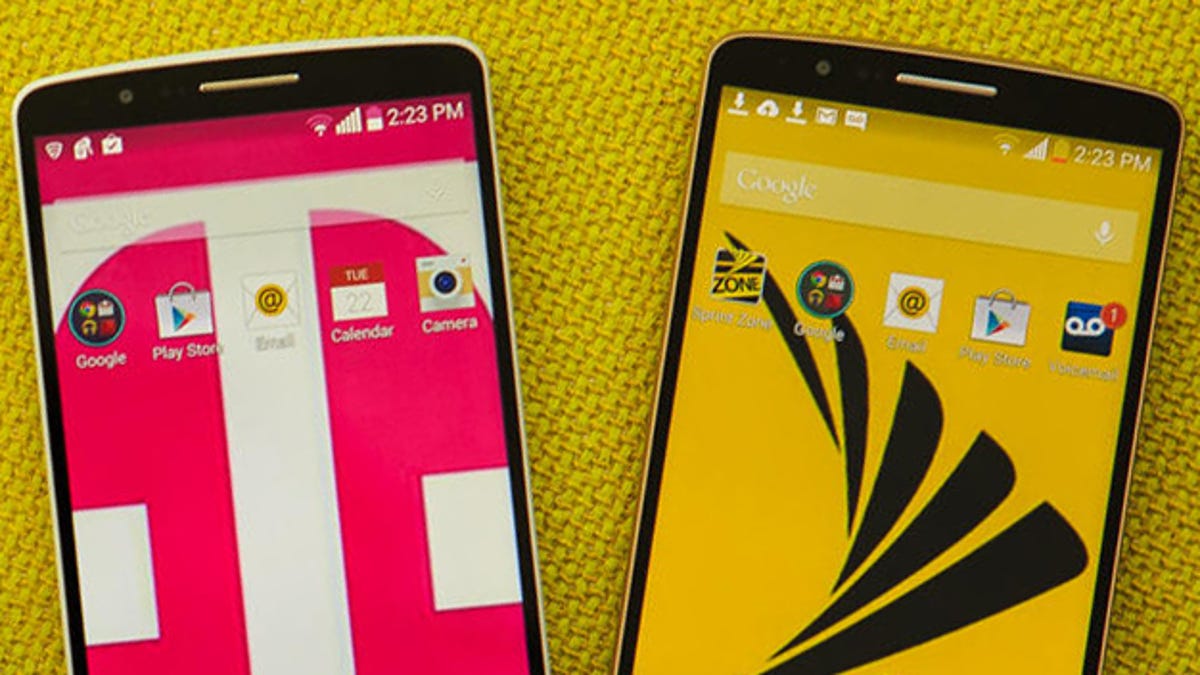How the T-Mobile-Sprint breakup affects you
The two carriers have decided not to merge. CNET sorts the winners and losers.

T-Mobile and Sprint are not getting together.
There will be no happily ever after for T-Mobile and Sprint .
The nation's third- and fourth-largest wireless carriers, respectively, said on Saturday that they have ceased discussions about a possible merger. Up until a week ago, people in the industry and on Wall Street assumed the two would get together, forming a potentially stronger combined company to take on larger rivals Verizon Wireless and AT&T .
That's no longer happening.
The result is things are going back to the status quo, with four national carriers and a lot of competition -- but a large gap between the top two and bottom two main carriers.
But what does this mean for you? CNET breaks down the winners and losers from T-Mobile and Sprint walking away from each other.
Winner: Consumers
The last few years have seen a frenzy of activity from the carriers as they bend over backwards to win your business. From aggressive free iPhone offers to the move back to unlimited data, consumers have had it pretty good. You can credit a lot of that to aggressive moves by smaller carriers T-Mobile and Sprint. Sprint may have topped things by offering a free year of service.
A move to three carriers instead of four would have eased the competitive pressure and the need to keep prices low and promotions flowing. Also, one less company would have meant a lower likelihood of a game-changing move like going all-in on unlimited data or offering phones through a leasing model getting introduced.
"Although we think that a combination of T-Mobile and Sprint would not have led to higher wireless prices for US consumers, it could have prevented irrational competition," said Mark Stodden, an analyst at Moody's. "Now that the deal is off, we think prices could take another leg down as both Sprint and T-Mobile seek to boost scale relative to market leaders Verizon and AT&T."
Let the bargains begin!
Loser: Consumers
OK, hear me out, since there's a flip side to the argument. The combination of T-Mobile and Sprint's assets would've made for a really appealing network.
Buckle up, we're going to get a little technical: Thanks to the last wireless spectrum auction, T-Mobile has a strong stash of low-band radio airwaves, which are great for pushing a signal across long distances and through building walls. But low-band spectrum doesn't have a lot of capacity, so there's a limit to how fast your connection is.
Sprint, meanwhile, has its big stash of both low- and high-band spectrum, with the high-band particularly valuable to improving capacity. That's especially useful in big cities where you're surrounded by people all uploading selfies or streaming videos at the same time -- that high-band spectrum is a fat pipe that can handle all of that traffic.
Of course, the culture clash and lack of execution could have turned the combined company into a joke. It happened when Sprint merged with Nextel back in 2005. You can argue Sprint is still trying to recover from that disastrous move.
Winner: T-Mobile
T-Mobile was in a strong position before the merger talks began, with its customer growth outstripping the rest of the industry. That doesn't change with Sprint walking away.
T-Mobile's position let parent and German telecom giant Deutsche Telekom dictate a majority stake in the proposed combined company -- a point that Sprint parent and Japanese carrier SoftBank couldn't live with.
The company's growth has slowed a bit, but relative to its competitors, it remains a clear leader in winning new customers.
While T-Mobile misses out on the spectrum from Sprint, Newstreet Research analyst Jonathan Chaplin said the company has options, including partnering with Dish Network or the cable companies.
Loser: Sprint
Sprint was the last-place carrier hoping to get a leg-up by joining with T-Mobile. By going at it alone, the company faces the tough prospect of pouring more money into its network -- particularly as companies move to 5G. Sprint Chief Financial Officer Tarek Robbiati said he doesn't foresee any problems with raising money for capital upgrades, and SoftBank CEO Masayoshi Son said Sprint would raise its capital expenditure to as much as $6 billion a year for the next few years.
"If they invest the capital required to deploy their spectrum they could be in a great position in a few years, but it will be a long wait," Chaplin warned. He downgraded his rating on the stock in the wake of the two splitting up.
Sprint also unveiled a reseller deal with cable provider Altice, which it touts as novel because they would each use the other's network assets. But Wall Street was underwhelmed by the partnership in the wake of a potential deal with T-Mobile.
JP Morgan analyst Phil Cusick said he expects Altice to launch a mobile offering in four to six quarters.
Loser: Verizon and AT&T
While the prospect of facing a stronger combined company would have been a potential long-term risk, Verizon and AT&T would have likely benefited from the near-term distraction of putting those two companies together.
Rather than focus on promotions and winning over customers, executives from both T-Mobile and Sprint would had to have turned their attention to the merger proceedings as well. Or a deal could have gone the disastrous Sprint-Nextel route, with Verizon and AT&T walking over their rival.
For now, all four carriers are on their own. Which means they all need to bring their A game.
The Smartest Stuff: Innovators are thinking up new ways to make you, and the things around you, smarter.
Tech Enabled: CNET chronicles tech's role in providing new kinds of accessibility.

